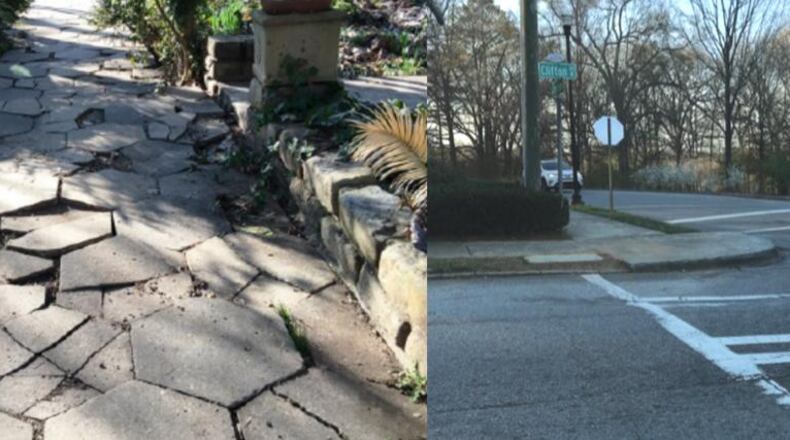Three wheelchair users have filed a federal lawsuit against the city of Atlanta, alleging that many of the city’s sidewalks and crosswalks are so dilapidated it’s difficult if not impossible to navigate them.
The suit seeks class-action status on behalf of all who use wheelchairs or other devices who encounter similar problems throughout the city. It alleges that Atlanta is in violation of the Americans with Disabilities Act.
The lawsuit, filed last month, said disabled people traveling in Atlanta neighborhoods encounter broken and uneven sidewalks; sidewalks obstructed by construction, trees and utility poles; and intersections with curb ramps that are missing, broken or otherwise unusable.
“Navigating sidewalks and intersections in this condition is a dangerous enterprise,” the suit said. “Disabled people often find themselves having to go into the street and move alongside vehicle traffic, at risk to life and limb.”
The city of Atlanta is committed to having streets and sidewalks that are accessible to everyone, a city spokesperson said in response to the lawsuit.
In 2009, the city entered into an agreement with the Justice Department that was designed to certain deficiencies, like sidewalk repairs, the spokesperson said, noting the city is not in violation of that ongoing agreement.
“This activity remains a priority for the city, as it will continue to make these improvements in the most fiscally responsible and prudent manner possible,” the spokeperson said.
The plaintiffs in the lawsuit are represented by two law firms: Radford & Keebaugh and Parks, Chesin & Walbert.
The suit cites a 2010 city audit that found 18 percent of the city’s sidewalk infrastructure had “deteriorated.”
Uneven sidewalks with broken pavement can be so jarring to wheelchair users they can cause them to fall to the ground, the suit said.
“Many disabled people simply avoid going out into the world, fearing that they will become stuck at an intersection lacking a curb ramp, or that they will be unable to travel along a broken sidewalk,” the suit said.
The plaintiffs are: Laurel Lawson, a software engineer and performance artist and athlete who regularly travels through Atlanta; James Curtis, a frequent volunteer at the Shepherd Center and a music lover who likes to see performances in the city; and James Turner, who works for DisABILITY LINK, a nonprofit that supports disabled people throughout the metro area.
In other news:
A statement released by the plaintiffs’ attorneys said the city of Los Angeles, in 2015, settled a similar lawsuit by agreeing to allocate $1.3 billion over 30 years to bring its sidewalks into compliance with the Americans with Disability Act. Earlier this year, the city of Portland settled another such suit by agreeing to allocate $113 million over 12 years to fix its sidewalks and curbs.
About the Author
The Latest
Featured



